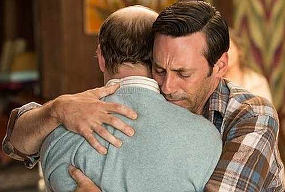I’ve been going to our church’s Sunday evening meeting rather than to the morning one. My son enjoys the teaching for teens more because it allows for interaction that a one-way sermon lacks. (Churches, take note.)
During the adult teaching, one of our church elders sat beside me. Afterward, he asked me a question:
“So Dan, what’s the word?”
He may have been asking how things were going with me, but I’d been ruminating on something all day, and it seemed like now was the right time to share it.
“I think we need to love people where they’re at,” I replied. “Not by some standard we impose on them or by our hopes for where we want them to be, but just as they are in that face-to-face moment with us.”
 Earlier in the day, I was thinking about a wonderful, Spirit-filled man who has since gone on to glory. He always wanted better for others, but he never approached people with that as his primary touchpoint. He met them where they were. In whatever sin they were ensnared. In their sadness or in their joy. In their fullness or in their need. He loved them in the moment, and he was loved by them for that reason.
Earlier in the day, I was thinking about a wonderful, Spirit-filled man who has since gone on to glory. He always wanted better for others, but he never approached people with that as his primary touchpoint. He met them where they were. In whatever sin they were ensnared. In their sadness or in their joy. In their fullness or in their need. He loved them in the moment, and he was loved by them for that reason.
Later that day, during worship time before the teaching, I thought about where we are as a society and how many people miss out on a relationship with God because they see Christians as a group of people with impossibly high standards. They don’t see Christians as capable of loving people in the moment, with no other expectations.
This elder and I are both in our 50s, with life experience similarities. Right now, I know a lot of men our age who are dying inside because circumstances weigh on them. Today, no demographic commits suicide at a higher rate (and increasing exponentially) than middle-aged, white males. It’s not hard to see why. Many have been laid off at that point in their careers when they should be stepping into the next level of career success; instead they find themselves unwanted, reduced to flipping burgers to make ends meet, and not even succeeding at that. Others are dealing with illness, either in themselves, their spouse, or their parents, and trying to be a caregiver and work a 60-hour week is grinding them down to a nub. Others grabbed for the brass ring and not only missed it, but they fell off the carousel entirely and can’t find a way to get back on. Others struggle with understanding what God put them on earth to do, especially if their map to purpose dried up and blew away, and they see nothing on the horizon except infirmity and uselessness.
These men often feel no one cares about them. That they’re used up. Done. Finished. Kaput. And no one tells them otherwise. Or they feel they need to be a fount of knowledge and wisdom, but they can’t immediately answer the questions they’re asked or meet the demands of others. Everyone expects something great now, and sometimes being great is for another day and not this second.
I looked at this elder, and I wondered if this is how he felt in that moment. I wondered if my word was for him.
Then I realized it’s for us all.
Love the people in front of you for who they are. Not for what they can do for you. Not for what you want them to be.
Husbands, wives, children, coworkers, bosses, cashiers at the grocery store, mailmen, garbage collectors, politicians, neighbors, strangers–hope for the best for them, but love them where they are.
None of us is good enough. Even in those rare times of greatness, peak performance may exist only for today or for this week. Tomorrow, we may only rise to the level of middling. Next week, we may utterly fail. Or not. Neither failure nor success should matter.
Love people for where they are right now.
Your unconditional love and mine may be what another needs to become what God hopes he or she will be.
